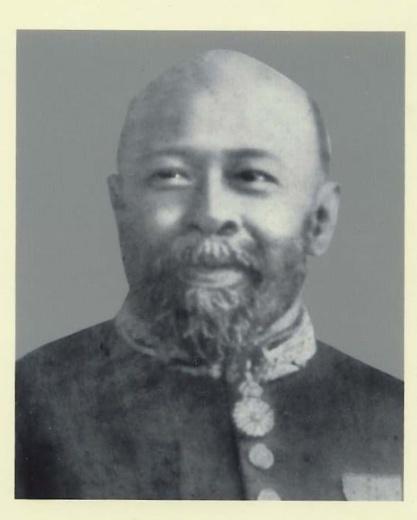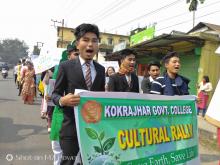Abdul Majid was a worthy son of Assam. He was born on 17th May 1868 in Balibat, Jorhat (now Bahadur Gaonbura Path) to a wealthy but orthodox family. His father, Mohammed Shah, was the Mauzadar of Titabar, Amguri, and Kharikatia Mauza, which was the largest Mauza in Assam and owned many farm lands near Jorhat, Titabar and Borhola (all in erstwhile Sivasagar District). His great grandfather Ahmed Shah, who came from a prosperous “Mudoi”(merchant) family also owned numerous properties in Jorhat. The family was originally from Goalpara (Assam) but had migrated to Jorhat in upper Assam, when the ruling Ahom Kings moved their capital from Sivasagar to Jorhat. The family remained very devout despite their prosperity and Abdul Majid’s grandfather Dar Shah Fakir, renounced worldly life to become an ascetic (“fakir”). He lived in a jungle near Naharani (Golaghat District) and after his death was buried in Parsi Paria Masjid compound in Kacharihat (near Golaghat).
Abdul Majid was a brilliant student and studied Arabic, Persian, Bengali, and Assamese in a local ‘Maktab’ (school), which was the norm of the time. By chance, some Baptist missionaries became aware of his capabilities and took it on themselves to nurture his unique talent by educating him in English and other subjects. His brilliance inspired them to name him “Black Jewel”. He was the first person from Jorhat to pass the “entrance examination” in 1882 from Jorhat High School at a tender age of fourteen and was awarded a scholarship of Rupees twenty per month to join Presidency College in Calcutta (now Kolkata). Ghanashyam Baruah from Sivasagar and Sonaram Baruah from Guwahati, his two contemporaries, also passed the entrance examination and followed the same path to Calcutta. In 1887, he passed his Bachelors of Arts with first class honours in English and became the first Assamese to be a first class honours graduate. The honours system was started in the University in the year when Abdul Majid enrolled in the Bachelor of Arts class.
In 1888, he joined Christ Church College in Cambridge to study law, on an annual government scholarship of 200 pounds per annum for three years. While going for higher studies, he travelled to England in the same ship with Mahatma Gandhi and initially stayed in Hotel Victoria in London with Gandhi and one other gentleman named Mazumdar. During the voyage he had social interaction with Mahatma Gandi. (Source : Mahatma Gandhi’s London Diary).
He earned his BA, LLB with distinction and on June 10th, 1891 he became a member of the Honourable Society of the Middle Temple and received the prestigious Bar-at-Law degree. The same year, he was awarded the Inn’s of Court Studentship and distinguished himself amongst the students of the four societies – Inner temple, Middle temple, Praise inn, and Lincoln’s inn (Source: The Law Journal June 13, 1891 and Biographical Register of Christ’s College 1505-1905, Courtesy Ritwik Majumdar, Amar Asom 21 September, 2015). On his return from the UK, he married Mafidan Nisa daughter of Munshi Rahmat Ali, an Honorary Magistrate from Puranigudam, Nagaon.
He began his illustrious career first as an E.A.C in Guwahati in 1892. Then he was transferred to erstwhile East Bengal, where he served as a District Magistrate primarily in Raj Shahi and Habiganj districts. In 1913, he returned to Assam and became the District Magistrate and Law adviser to the government of Assam. He also served as a Justice at Calcutta High Court for a short period in 1920 and was the first Assamese to have this distinction. For his service to the administration, he was awarded the CIE (Companion of Indian Empire). In 1921, he became the honorary member of the Executive Council of Government of Assam – the first such position in Assam and equivalent to a ministerial position. He received the appointment from King George the V in a ceremony in the UK. His wife also accompanied him to attend that ceremony. The same year he was awarded the Grant of Insignia by the British Government. He was also nominated for knighthood. .
Despite his Western education and demanding career in Bengal, he maintained his deep love for the Assamese language and culture. As a young student in Calcutta, he was one of the founders of the Assam Social Literary Club along with his compatriot Ghanashyam Baruah. Later the Club became the Asomiya Bhasha Unnatti Sadhani Sabha. This association became the inspiration for the formation of Asom Sahitya Sabha. (Source: Asomiya Bhasha Sahitya, Asom Sahitya Sabha aru Asomar Musalman, Ismail Hussain, Gyan Sambhar, Feb 2004).
He was an integral part of the Assamese literary scene. His command of Assamese language was impeccable to the extent that Lakshminath Bezbaruah, doyen of Assamese Literature, requested that Abdul Majid to proofread his translation of E. Marsden’s History of India. Below are the diary entries of Lakshminath Bezbaruah (Source: Prafullah Bezbaruah, Sivasagar)
• 5 April 1907: Finished copying the translation of Marsden’s History of India.
• 6 April 1907: Sent by two Book Post Registered parcels 9 mss books my translation of Marsden’s History of India to Mr. Mazid, Rajshahi.
Lakshminath Bezbaruah and Abdul Majid shared a close friendship with Bezharuah staying in Shillong to visit his friend during his trips from Sambalpur to Dibrugarh (Prof. Hiren Datta, Guwahati). Bezbaruah’s close relationship with Abdul Majid is reflected in his dedication of his book ‘Kadam Kali’ – a collection of his poetries-to Abdul Majid. The dedication page reads as follows:
“To Abdul Majid,who is like a brother to me, I dedicate this book–Sri Lakshminath, 1835 Saka ( AD1913). ( Source:Dr. Jogendranarayan Bhuyan, 2007).
Abdul Majid also had a very close relationship with Jatindra Nath Duarah, who tutored Abdul Majid’s daughter, who was a student of Loreto Convent, to enable her to successfully learn Assamese within a year and pass the matriculation examination. Aside from this, in 1896 Abdul Majid proofread Mafijuddin Ahmed Hazarika’s’ Gyan Malini’ and recommended it to be included in the school curriculum. Just before the formation of Asom Sahitya Sabha in 1915, Abdul Majid and Padmanath Gohain Baruah played a key role in supporting the development of local industries and Assamese literature by participating in a meeting, the first of its kind, which was sponsored by Colonel Gordon, Commissioner of Assam Valley, and chaired by Rai Bahadur Phanidhar Chaliha. (Ismail Husain, Gyan Sambhar, February 2004). Abdul Majid and Colonel Gordon published an English translation of Assamese Proverbs and Adages. Abdul Majid served as the President of the Committee that planned to collect the local Assamese Folk Stories to preserve them for posterity. He appealed to the Assamese public through the Magazine ‘Jonaki’ to provide these traditional oral stories.
Abdul Majid’s literary contribution is further highlighted in this quote by Late Prafulla Bezbaruah ( Prantik, March 2005 ) – “Here I want to mention the pride of Assam, Majid Sahib. When he was District and Session Judge of Rajshahi District, of pre-partition Bengal, he edited and published two wonderful books in 1910 for students of 1st and 2nd standard in the lower primary curriculum, which contained the work of poet Sulaiman Khan, Baladev Mahanta, and Ananda Chandra Gupta (Agarwala). Even with his job responsibilities, he made time for such literary work that shows his love for both children and literature.” According to Prafulla Bezbaruah, both Sulaiman Khan’s and Baladev Mahanta’s collections of poetries, as well as Abdul Majid’s two books are worthy research topics.
Before Henry Cotton’s arrival in Assam to take up the position as the 1st Chief Commissioner of Assam, both Abdul Majid and Dr. Golap Chandra Bezbaruah met with him and presented him with a congratulatory letter, in which they highlighted the problems facing Assam and requested him to find some solutions for them.
To strengthen the economy of Assam he wrote a beautiful article as a foreword in a Government of Assam publication, 1903, Shillong on the topic of wood carving in Assam and how to revive the moribund Cottage Industry. All of the above illustrates his love for Assam and Assamese language and literature (Paban Bezbaruah Prantik, 16 October 2009).
According to family sources Abdul Majid donated two pieces of land around 1911 in the heart of Jorhat Town - one for Jorhat Govt. Girls M.E.School and another for a Girls Primary School. For decades these two schools were the only reputable institutions for Girls Education and girls flocked to them from a distance of 3 to 4 kilometers.
Abdul Majid had an extensive library with a collection of unique books in his Shillong residence, Gulistan. Unfortunately, after his sudden demise the library was not preserved and the whereabouts of the valuable books and manuscripts were not known till now. However, it has come to light recently with the help of Mubarak Lyngdoh, who is a neighbor of Dutta, heir of the new owner (Sushil Dutta) of Old Gulistan. Mubarak has contacted Dutta and Mrs. Uma Purkayastha, who is a resident of an adjoining property of Dutta. After purchasing the property of Old Gulistan, Sushil Dutta parceled out the Orchard and the Flower Garden into twenty plots and sold them out. Mrs Uma Purkayastha and her husband were occupants of one of the plots. From Mubarak we came to know that Abdul Majid’s third son, Isfakul Majid took away some books to Bangla Desh, when he came on a visit to Shillong in 1972. Some books were taken away by Mereja Majid (widow of Abdul Majid’s youngest son Safkat Majid) to her new cottage near New Gulistan. New Gulistan was constructed by her husband in the personal Tennis Court of Abdul Majid. Rest of the books were left with the new owner Sushil Dutta, to dispose off at his own discretion. Most of these books were taken away by the family members of Dutta to Kolkata and other places.
I had a telephone conversation in October, 2015 with Mrs. Uma Purkayastha and had some interesting information. Earlier I have mentioned that Abdul Majid had a good rapport with Lakshminath Bezbaruah who used to visit Shillong for a day or two on his way to Dibrugarh from Sambalpur. In one such visit to Gulistan in 1923 he came to Shillong with his daughter Ratna. Suddenly Ratna developed high fever and Lakshminath Bezbaruah and Abdul Majid went to Dr. Bidhan Roy’s house which was on an adjacent hilltop. There they found Kabiguru Rabindranath Tagore also sitting with Dr. Roy. Hearing about the ailment Rabindranath Tagore went out and fetched his Homeopathy medicine box (he was a believer in Homeopathic treatment) from ‘Jeet Bhumi’,the house of his niece Manisha Devi and her husband Dr. Debendranath Chatterjee, which was nearby and came to Gulistan to treat Ratna. Dr. Roy also came with them. At that time RabindranathTagore was staying with his niece’s family for about two months. At the request of Mrs Majid, Kabiguru visited them again and entertained them with his wonderful Rabindra Sangeet. So we can just imagine how well acquainted Abdul Majid was with all of them. This piece of information is documented by Mrs. Uma Purkayastha in her book ‘Tagore and Pineland Shillong’ (Released in May, 2015). She also gave us some valuable information about the books Mereja Majid kept with her. She had no children, so fearing that the books will be spoiled after her, she sold them around 1982/1983 to Purkayasthas, who were book lovers. After the death of her husband Uma Purkayastha donated the books to Ramkrishna Mission and other charitable institutions.
But Abdul Majid’s brilliant career and life came to an untimely and sudden end due to ill health in 26th November, 1924. He was survived by 4 sons and 3 daughters. His eldest son was Inamul Majid (1922 ICS – 2nd such Assamese officer) who served as High Commissioner of Andaman and Nicobar Islands. His third son Isfakul Majid was the second Indian to graduate from Sandhurst Military School and had a successful military career. His youngest son Safkat Majid was a Director of Agriculture in Assam Government. His second daughter Zubaida Ataur Rahman, who was a social worker, was awarded the Kaizer- e-hind medal and she was the 1st woman President of Assam Legislative Council (Source: Council Records courtesy S.H.Choudhury). She was the founder president of Shillong Mahila Majlis formed in 1958. His youngest daughter, Mafida Majid was the first Assamese Muslim woman graduate – she studied in Calcutta University
I would like to acknowledge the help I received in my efforts from my husband Komoruzzaman Ahmed from the early stages of my research and the relevant information that he gleaned from different sources, Ritwik Mazumdar from Nagaon for providing details related to Abdul Majid’s early education and career, Mubarak Lyngdoh for current details regarding the Gulistan library and its contents and my younger brother Wahid Saleh for his useful suggestions and information. Other sources of information are acknowledged in the body of the text.
- by Dabira Sultana Ahmed
(The writer is Granddaughter of Abdul Majid’s youngest brother Abu Sahid Shah)






Comments
I am the great great
Add new comment